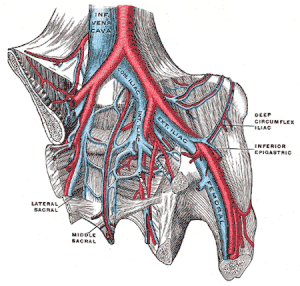May–Thurner syndrome
| May–Thurner syndrome | |
|---|---|
 |
|
| Iliac veins | |
| Classification and external resources | |
| Specialty | cardiology |
| ICD-10 | I80.2 |
| DiseasesDB | 33411 |
In medicine, May–Thurner syndrome (MTS), also known as the iliac vein compression syndrome, is a rare condition in which compression of the common venous outflow tract of the left lower extremity may cause discomfort, swelling, pain or blood clots, called deep venous thrombosis (DVT), in the iliofemoral vein.
The specific problem is compression of the left common iliac vein by the overlying right common iliac artery. This leads to pooling or stasis of blood, predisposing the individual to the formation of blood clots. Uncommon variations of MTS have been described, such as the right common iliac vein getting compressed by the right common iliac artery.
In the 21st century the May–Thurner syndrome definition has been expanded to a broader disease profile known as nonthrombotic iliac vein lesions (NIVL) which can involve both the right and left iliac veins as well as multiple other named venous segments. This syndrome frequently manifests as pain when the limb is dependent (hanging down the edge of a bed/chair) and/or significant swelling of the whole limb.
May–Thurner syndrome (MTS) is thought to represent between two and five percent of lower-extremity venous disorders. May–Thurner syndrome is often unrecognized; however, current estimates are that this condition is three times more common in women than in men. The classic syndrome typically presents in the second to fourth decades of life. In the 21st century in a broader disease profile, the syndrome acts as a permissive lesion and becomes symptomatic when something else happens such as, following trauma, a change in functional status such as swelling following orthopaedic joint replacement.
It is important to consider May–Thurner syndrome in patients who have no other obvious reason for hypercoagulability and who present with left lower extremity thrombosis. To rule out other causes for hypercoagulation, it may be appropriate to check the antithrombin, protein C, protein S, factor V Leiden, and prothrombin G20210A.
...
Wikipedia
